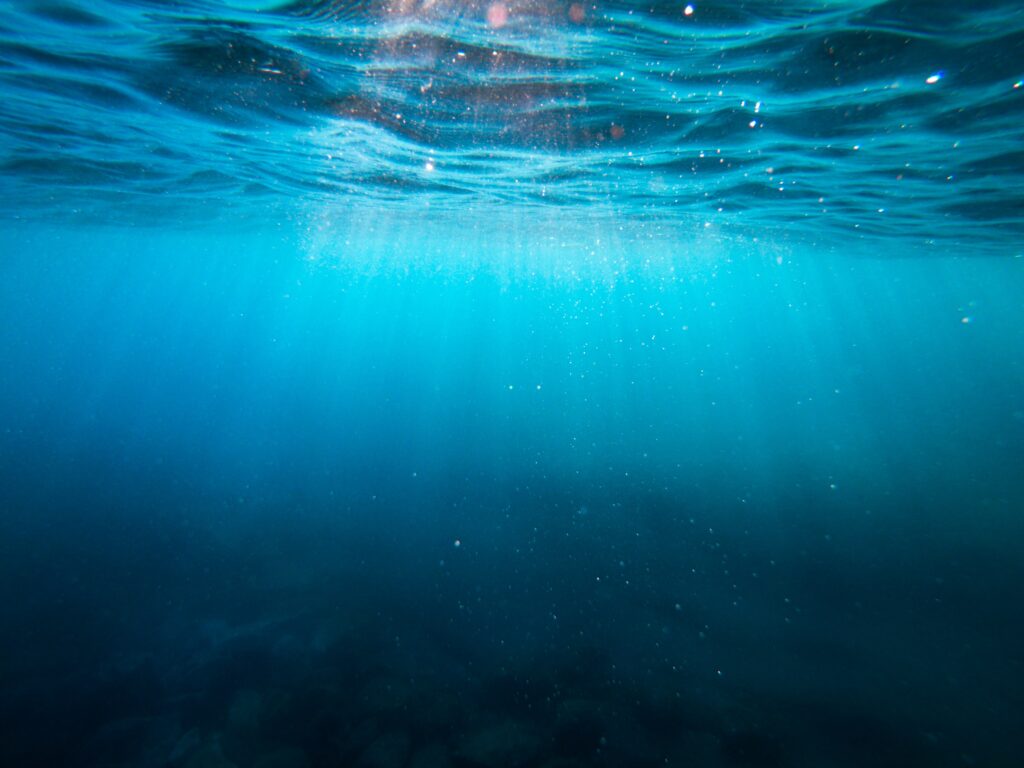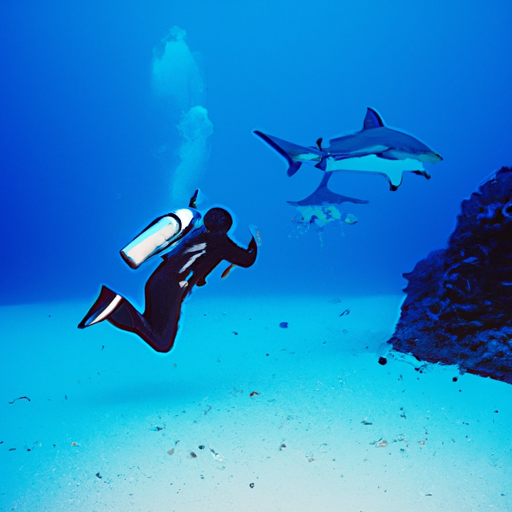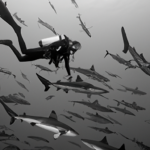So you’re fascinated by the world of diving and have always wondered, “How do divers deal with sharks?” Well, look no further, because we have the answer! In this article, we will uncover the strategies and techniques that divers use to peacefully coexist with these magnificent creatures. From understanding shark behavior to implementing safety protocols, we’ll take a closer look at the fascinating world of shark-human interaction. Get ready to unravel the secrets of how divers navigate the depths of the ocean alongside these incredible predators!

Behavior of Sharks
Sharks are fascinating creatures that have intrigued and captivated people for centuries. Understanding their behavior is key to ensuring a safe diving experience. Sharks have evolved to thrive in various habitats, ranging from tropical coral reefs to deep-sea trenches. Their behavior is heavily influenced by their natural habitat.
Sharks’ Natural Habitat
Sharks can be found in oceans all around the world, although some species may prefer specific regions. From the iconic Great White Shark to the graceful Whale Shark, each species has its preferred environment. Some sharks, like the Hammerhead Shark, are commonly found in shallower coastal waters, while others, such as the Blue Shark, venture into deeper open waters.
Sharks’ Feeding Habits
Sharks are carnivorous predators and play a crucial role in maintaining the balance of marine ecosystems. Most sharks are opportunistic feeders and will prey on a variety of marine life, including fish, seals, and even other sharks. They use several senses, such as smell, sight, and electroreception, to locate their prey.
Sharks’ Aggression Triggers
Contrary to popular belief, sharks are not mindless killing machines. They typically do not pose a threat to humans unless provoked or mistaken for prey. Sharks can be triggered by certain behaviors that may be perceived as a threat, such as sudden movements, splashing, or wearing shiny objects that resemble fish scales. Understanding these triggers can greatly reduce the likelihood of aggressive encounters.
Diving Techniques to Avoid Sharks
Diving alongside sharks can be an exhilarating and awe-inspiring experience. However, it is essential to employ specific techniques to ensure both your safety and the well-being of the sharks.
Diving in Groups
One of the most effective ways to minimize the risk of shark encounters is to dive in groups. Sharks are less likely to approach larger groups of divers, as they may perceive them as a potential threat. Staying close to your dive buddies and following the guidance of the dive leader adds an extra layer of security.
Avoiding Provocation
Provoking sharks is a recipe for disaster. To avoid antagonizing them, it is crucial to maintain a calm and respectful demeanor underwater. Avoid sudden or jerky movements, as they can be mistaken for a distressed prey. Swimming smoothly and using slow, deliberate strokes can help convey that you are not a threat.
Maintaining Calm and Confidence
Sharks are highly sensitive to the energy and body language of those around them. By exuding confidence and remaining calm, you communicate to the sharks that you are in control, and there is no reason for them to feel threatened. Remember to control your breathing, as rapid, panicked breaths can signal distress and attract unwanted attention.
Equipment and Gear for Shark Diving
When diving with sharks, certain equipment and gear can enhance your safety and comfort during the dive. Staying informed about the latest advancements in shark repellents, dive masks, and protective suits is essential.
Shark Repellents and Deterrents
Shark repellents and deterrents have gained popularity in recent years. These devices emit pulses, sounds, or electric fields that are designed to deter sharks from approaching. While their effectiveness varies, some divers find them helpful in creating an additional layer of defense against potential shark encounters.
Shark Shields and Dive Masks
Shark shields are wearable electronic devices that create a protective electromagnetic field around the diver, keeping sharks at bay. Similarly, some dive masks are equipped with shark deterrent technology, such as reflective surfaces or patterns that discourage sharks from approaching too closely. These innovations provide reassurance for divers venturing into shark-populated waters.
Protective Sharkproof Suits
For those seeking extra protection, sharkproof suits can provide peace of mind during shark dives. Made from high-tech fabrics, these suits create a physical barrier between the diver and the shark. While these suits are not foolproof, they can serve as a last line of defense against potential shark bites.
Understanding Shark Behavior
To safely interact with sharks, divers must develop a solid understanding of shark behavior. Learning to recognize their body language, understanding warning signs, and familiarizing oneself with shark species are essential aspects of shark diving.
Learning Shark Body Language
Sharks communicate through body postures and movements. By observing their behavior, divers can gain insight into their intentions and emotional state. For example, an agitated or defensive shark may exhibit rigid body movements, hunched posture, and rapid tail movements. Conversely, a relaxed shark may display smooth, effortless swimming motions.
Recognizing Warning Signs
Sharks often exhibit certain warning signs before becoming aggressive. These signs may include an arched back, lowered pectoral fins, and rapid side-to-side head movements. If a shark displays these behaviors, it is crucial to maintain distance and avoid any provocation that could escalate the situation.
Understanding Shark Species
Not all sharks have the same behavior or pose the same level of risk to divers. Familiarizing yourself with the specific characteristics and behavior patterns of different shark species can help you make informed decisions and assess the potential risks associated with a particular dive site. Each species has its own unique traits and tendencies, so being knowledgeable can enhance your overall safety.

Shark Conservation and Awareness
Shark conservation and raising awareness about their importance in marine ecosystems is crucial for their survival. Divers can actively contribute to shark conservation efforts through various initiatives and practices.
Promoting Education and Understanding
Educating others about sharks and dispelling myths or misconceptions surrounding them is an important step towards their conservation. By sharing knowledge and personal experiences, divers can help others appreciate the beauty and significance of these magnificent creatures.
Supporting Marine Protected Areas
Marine protected areas (MPAs) play a vital role in preserving shark populations and their habitats. Divers can support these initiatives by advocating for their establishment, respecting their boundaries while diving, and participating in conservation projects within MPAs.
Participating in Citizen Science Initiatives
Citizen science initiatives enable divers to actively contribute to scientific research and conservation efforts. By collecting data, documenting shark sightings, and sharing observations with researchers, divers can contribute valuable insights into shark behavior and population dynamics.
Diving in Shark-Infested Waters
For adventurous divers seeking close encounters with sharks, diving in areas known for their shark populations is an exciting option. However, it is crucial to take necessary precautions and abide by local regulations and guidelines.
Selecting Dive Sites with Shark Populations
To increase your chances of encountering sharks, research and select dive sites known for their shark populations. Consult with local dive operators or experienced divers who can provide insights into the best dive sites and seasons for encountering sharks.
Adhering to Local Regulations and Guidelines
Before embarking on a shark dive, familiarize yourself with the local regulations and guidelines regarding interactions with sharks. Some dive sites may have specific rules, such as maintaining minimum distances or restrictions on certain activities. Respecting these regulations ensures both your safety and the well-being of the sharks.
Working with Certified Dive Operators
When diving in shark-infested waters, it is advisable to choose a certified dive operator with extensive experience in conducting shark dives. These professionals are trained in shark behavior, safety protocols, and emergency procedures. Their expertise and guidance can help ensure a successful and secure shark diving experience.

Shark-Diving Best Practices
To promote responsible shark diving and maintain a harmonious coexistence, adhering to certain best practices is essential.
Respecting Sharks’ Personal Space
Just like any other wild animal, sharks deserve their personal space. Avoid approaching sharks too closely or attempting to touch them. Maintaining a respectful distance ensures the safety of both divers and sharks and minimizes any potential disturbances.
Avoiding Flash Photography
Bright flashes from underwater cameras can startle sharks and may provoke aggressive behavior. Avoid using flash photography when diving with sharks to mitigate any unnecessary risks and maintain a calm environment.
Not Touching or Harassing Sharks
Touching or harassing sharks can disrupt their natural behavior and potentially lead to dangerous situations. Keep your hands to yourself and avoid any behaviors that can be interpreted as aggressive or threatening towards the sharks. Respect their space and observe from a distance.
Emergency Procedures When Sharks Approach
Despite taking precautions, there may be instances when sharks approach divers unexpectedly. Being prepared for such situations is crucial for everyone’s safety.
Applying Buddy System
The buddy system is a fundamental rule in diving, and it becomes even more vital during encounters with sharks. Stay close to your dive buddy and maintain visual contact at all times. If a shark approaches, your buddy can provide assistance and help implement emergency procedures.
Signal for Help
During a shark encounter, it is essential to remain calm and alert. If you feel threatened or need assistance, use established hand signals to alert your dive buddy or the dive leader. Open communication ensures swift action and enables the team to initiate the appropriate response.
Deploying Shark Repellents
If all else fails and a shark becomes persistently aggressive, deploying a shark repellent device may be necessary. Familiarize yourself with the proper use of shark repellents and seek guidance from experienced divers or dive professionals. These devices can provide an additional layer of protection in extreme situations.

Training and Certification for Shark Diving
Obtaining proper training and certification is essential for divers who want to safely engage in shark diving activities. Specialized courses and certifications equip divers with the necessary knowledge and skills to navigate the unique challenges associated with shark encounters.
Learning from Experienced Instructors
Enrolling in dive courses taught by experienced instructors who specialize in shark diving is highly recommended. These professionals can share their expertise, guide you through shark diving techniques, and provide insight into the intricacies of shark behavior. Learning from the best sets the foundation for a safe and enriching shark diving experience.
Obtaining Shark Diving Certification
Certification programs specific to shark diving are available to divers who want to deepen their knowledge and demonstrate their competence in this specialized field. These certifications validate your skills, knowledge, and commitment to responsible shark diving practices.
Continuing Education and Refresher Courses
Shark diving is a dynamic and ever-evolving field. Continuing education and periodic refresher courses are crucial to stay updated with the latest research, technologies, and best practices. Ongoing learning ensures that you are well-prepared to adapt to new challenges and contribute to the conservation and safety of sharks.
Success Stories and Encounters
Divers around the world have shared numerous exciting and positive encounters with sharks. These firsthand experiences highlight the beauty and importance of sharks in our oceans.
Divers Sharing Positive Experiences
Many divers recount breathtaking moments of swimming alongside sharks, witnessing their grace, and appreciating their role in the marine ecosystem. These stories serve as a testament to the peaceful coexistence between humans and sharks, showcasing the rewards of responsible shark diving practices.
Experiencing Sharks up Close
Encountering sharks up close allows divers to observe their behavior, appreciate their unique features, and develop a profound respect for these incredible creatures. For those who have overcome their initial fears or misconceptions, diving with sharks often becomes a lifelong passion and source of inspiration.
Overcoming Fear and Misconceptions
Shark encounters can help dispel myths and misconceptions surrounding these magnificent creatures. By experiencing sharks in their natural habitat, divers often develop a deeper understanding and appreciation for their vital role in maintaining the health of our oceans. These encounters can profoundly impact people’s perceptions, transforming fear into fascination and advocacy.
In conclusion, sharks are awe-inspiring creatures that deserve our respect and understanding. By employing proper diving techniques, utilizing appropriate equipment, and fostering shark conservation and awareness, divers can safely and responsibly enjoy the incredible experience of diving with sharks. With education, preparation, and a commitment to shark conservation, we can help create a harmonious relationship between humans and these remarkable animals. So go ahead, dive in, and explore the captivating world of sharks with confidence and respect.

- Can You Dive With Sharks In California? - August 19, 2023
- What Are The Rules Of Shark Cage Diving? - August 19, 2023
- Where In Florida Can You Dive With Sharks? - August 19, 2023








